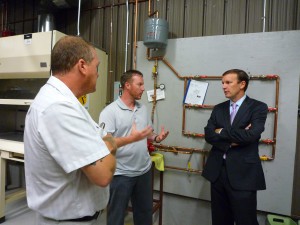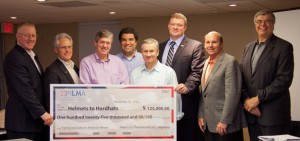Proposed Medicare Part D Prescription Drug Rebates Result in Diminished Multiemployer Plan Benefits
June 18, 2013
Ironworkers General President and Pharmaceutical Industry Labor-Management Association (PILMA) Chairman Walter Wise released the following statement today following the publication of PILMA’s new study Medicaid Drug Rebates in Medicare Part D Low-Income Subsidy: An Economic Analysis of the Proposed Policy and its Implications for Multiemployer Plans:
“The study released today demonstrates that new government rebates imposed on the Medicare Part D prescription drug program would result in a cost-shifting from government to private payers. This shift would potentially increase health insurance costs and threaten the jobs and health of Americans who draw health coverage from Taft-Hartley multi-employer plans.
The study’s examination of how cost-shifting would be absorbed in the prescription drug market produces empirical evidence that new rebates would severely impact multi-employer plans.
Politicians and officials advocating for new rebates to Medicare Part D plans have been working under the false assumption that the Medicare Part D Low-Income Subsidy (LIS) and non-LIS prescription drug markets function independently. However, PILMA’s study finds that these two markets are inextricably linked. As a result, imposing new rebates would distort the overall prescription drug market and shift costs onto private payers.
This shift would have a devastating effect on multi-employer plans, which may be forced to raise premiums, restrict access to medications, adopt increased cost-sharing measures, or even reduce wages to offset potential cost-shifting.
New rebates to Medicare Part D have already been shown to negatively impact jobs as well. The Battelle Technology Partnership released a report in 2009 that found that any policy change that would reduce industry revenue of the magnitude, such as the proposed Medicare Part D rebates, could eliminate between 130,000 and 260,000 jobs from the biopharmaceutical industry, with many potential cuts affecting unionized construction workers.
Combined with the severe strain additional rebates would put on multi-employer plans, changes to Part D would deal a double blow to the incomes and wellness of our nation’s skilled workers in the building crafts.
In October 2010, the member unions and companies of PILMA warned that potential new rebates to the Medicare Part D prescription drug program would result in cost-shifting. It was clear then, as it is now, that rebates would have a drastic negative impact on Taft-Hartley multi-employer plans and the Americans who rely on these plans for jobs, affordable access to medicines, and chronic disease prevention and treatment. PILMA passed a resolution calling on the President and Congress to protect Medicare Part D and the jobs and benefits it provides.
Earlier this year, I sent letters to the U.S. Senate Budget and Aging Committees, as well as to leaders in both the House and Senate, urging Congress to reject new rebates.
Today that call is reiterated. The biopharmaceutical industry and the workers who rely on the benefits provided by multi-employer plans make significant contributions to our lives every day. Imposing new rebates to Medicare Part D would have a detrimental effect on the world’s best trained workers and their ability to produce the high quality work that drives our economy and benefits the public health.”
To read the full study and executive summary, please click here.



